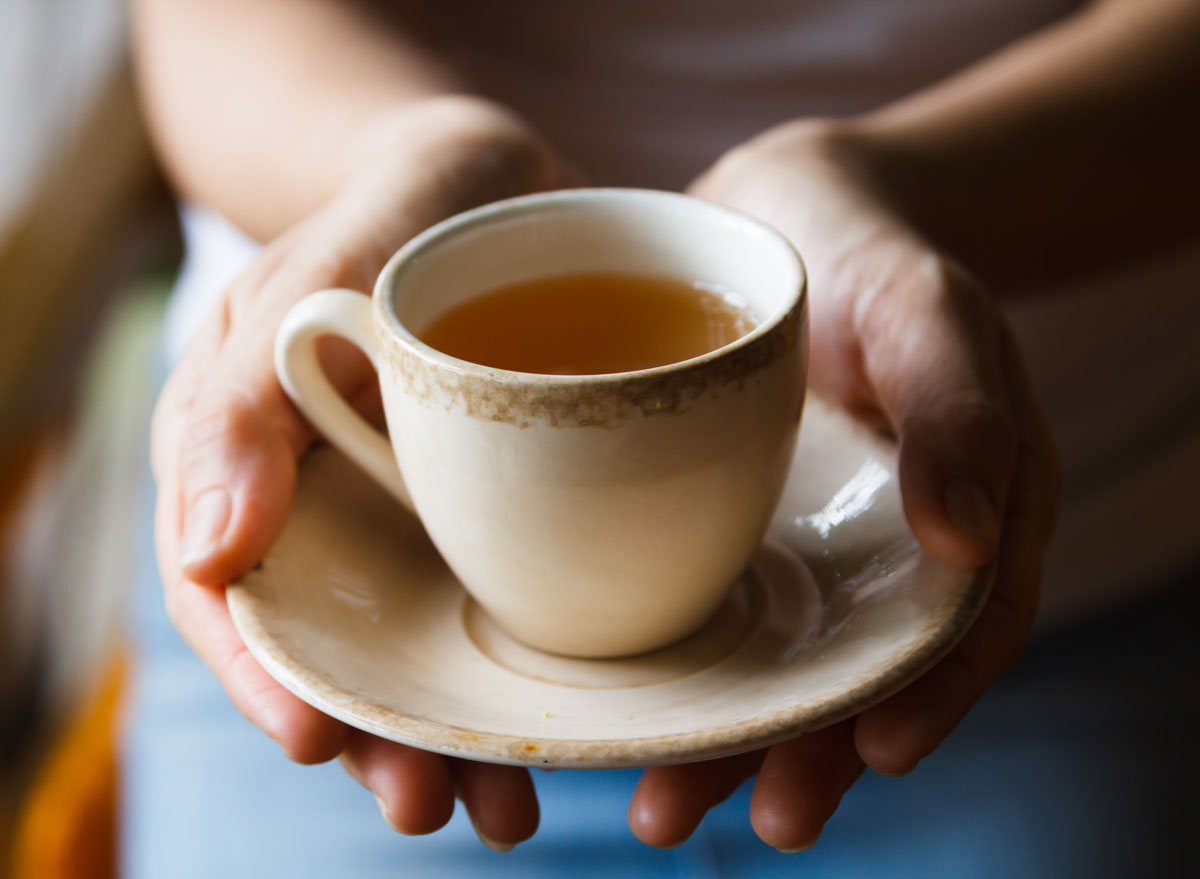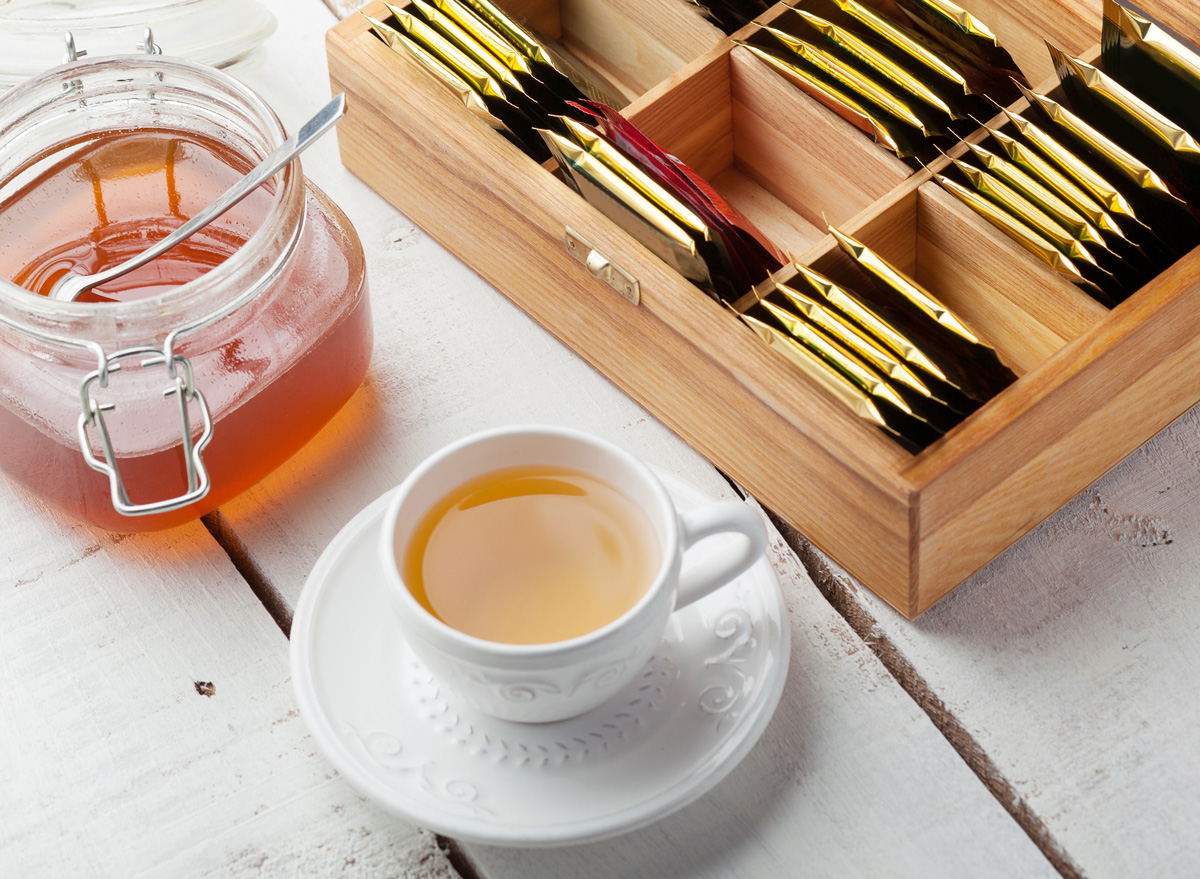Dangerous Side Effects of Drinking Too Much Tea, According to Science

The benefits of tea seem endless. It's been shown to lengthen your life, boost your metabolism, promote weight loss, support memory, and more.
But you've probably heard the saying: "too much of a good thing can be a bad thing." And that mantra holds true even for a healthy drink like tea.
Tea comes from tea leaves—like black, green, and white—that are caffeinated. (Herbal teas don't have any caffeine, and they won't typically be judged against tea leaf teas when it comes to overdoing it.) As you're probably aware, many of the same 5 Side Effects of Drinking Too Much Coffee due to high caffeine intake can also apply to a caffeinated beverage like tea.
Moderate tea consumption of under 3 cups of tea a day can convey a myriad of health benefits, but drinking too much tea, which is exceeding 3–4 cups per day, has been linked to a few negative side effects.
Read on to discover what can happen to your body when you drink too much tea, and remember, as long as you drink tea in moderation, you can reap the 7 Amazing Benefits of Drinking Green Tea.
The tannins may reduce your iron absorption

Tannins—the polyphenol compounds that make drinks like tea and wine taste bitter—may inhibit the body's absorption of iron, when consumed in excess (more than 4 cups), according to a study published in Food Research International. They bind with iron, specifically non-heme iron, that is found in plant foods such as spinach, beans, and nuts. While a Current Developments in Nutrition review found that tannic acid and tea consumption can impair iron bioavailability, they also note that a lack of long-term studies means that they can't draw any conclusions to whether this habit can negatively affect your health. Worst case scenario, make sure you're eating enough iron-rich foods on a regular basis.
You may be exposed to significant levels of toxins

As is the case with almost any food that is cultivated nowadays, tea leaves can contain or absorb various toxic compounds from the soil or through harvesting methods. Studies have discovered levels of toxin in many different types. For example, a Journal of Toxicology study found that when researchers tested 30 types of tea—which included black, green, white, and oolong varieties—all of them contained lead.
As the researchers increased steeping time, levels of lead increased. All brewed teas contained trace levels of lead, but 73% of teas brewed for 3 minutes and 83% brewed for 15 minutes contained levels considered unsafe for consumption during pregnancy and lactation. Aluminum levels were above recommended guidelines in 20% of brewed teas. At this point, the researchers urge you to be aware that you may be exposed to these toxic elements, but that it's more important to take a look at your overall daily consumption of toxins, like those from tainted supplements or contaminated drinking water, rather than tea alone.
You may cause liver damage

When researchers tested tea bags versus tea leaves, they found higher levels of fluoride in higher-priced, higher-quality tea bags, according to a Food Research International study. Brewing the tea for two minutes resulted in teas in the range of 3.6 to 7.96 milligrams per liter of flouride. That means if you consume more than four cups of coffee (one liter) a day, you could exceed the dietary reference intake (DRI) of 4 milligrams per day of fluoride. Researchers hypothesized that loose tea comes from harvesting different parts of the plant and the techniques used to do so. Consuming too much fluoride can damage teeth, bones, and joints. Note that the study only tested UK teas, so we may not be able to draw the same conclusions with US tea bags. At the least, it appears that opting for loose leaf tea is the way to go, and to not drink too much tea — keep it to under 4 cups.
Related: 10 Signs You're Drinking Too Much Tea
You may feel anxious, have trouble sleeping, or get headaches

Tea contains caffeine. Less than coffee—between 20 and 60 milligrams per cup—but if you're drinking too much tea, that caffeine adds up. Too much caffeine has been linked to sleep disruption, heartburn, headaches, and anxiety. Each of these negatives effects tends to only happen when consuming caffeine in excess, between 100 and 200 milligrams per day. Depending on the variety of tea you drink, you may overdo it at anywhere between 2 to 10 cups of tea.
Lemon teas may contain higher levels of heavy metals

White, green, black teas with added citric acid may have higher levels of aluminum, cadmium, and lead, according to a study published in the Journal of Food Composition and Analysis. Lemon teas, in particular, contained levels 10 to 70 times higher than these other teas. So although citric acid is an antioxidant ingredient that increases phenolic compounds and beneficial tract element concentrations, like magnesium, it does come at the cost of increased availability of toxic metals.
To reduce your exposure, opt for loose leaf teas. The researchers note that infusions made from loose tea leaves possess a lower content of harmful elements as aluminum, cadmium, and lead compared to powdered bag teas. And if you want that lemon flavor, maybe try lemon water: What Happens To Your Body When You Drink Lemon Water Every Day.








